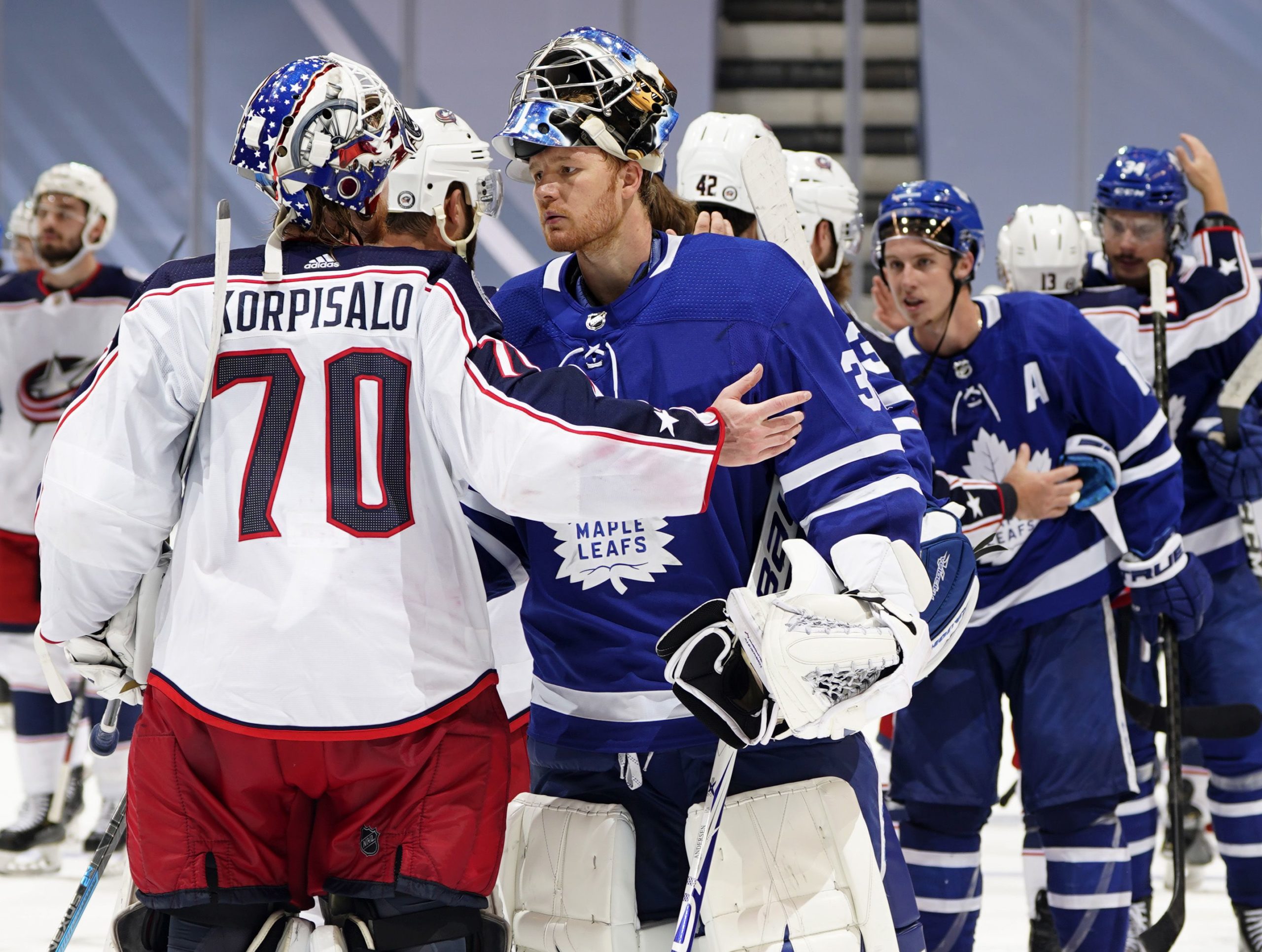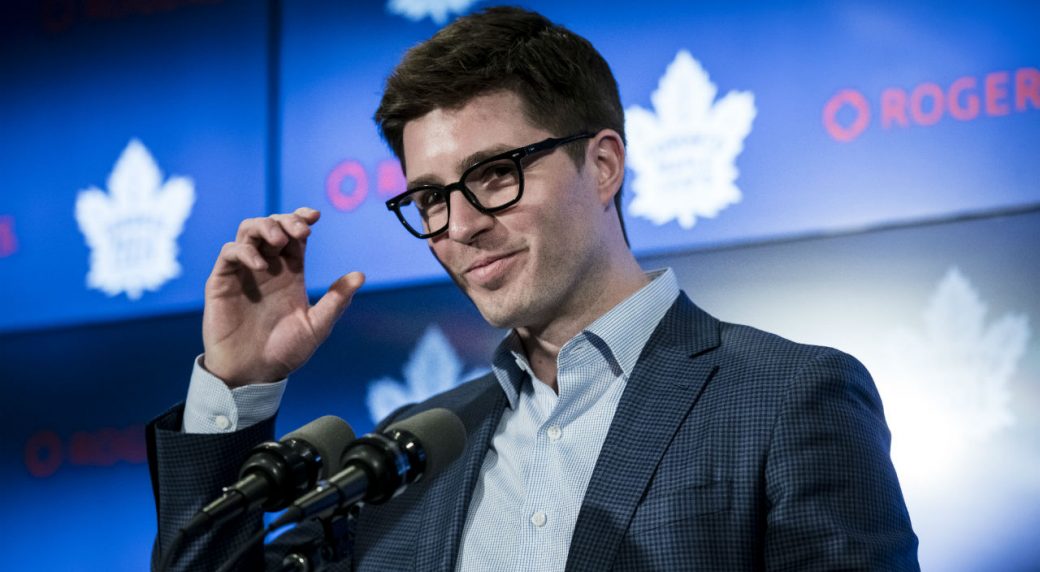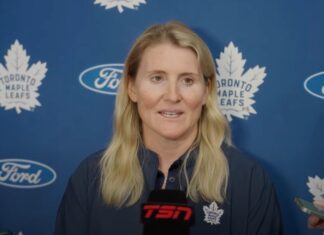General Manager Kyle Dubas addressed the media at the opening of 2021 training camp on Sunday, discussing the team’s aspirations for this season in a unique Covid-impacted schedule that will feature exclusively all-Canadian regular-season matchups.
2021 Toronto Maple Leafs Training Camp Roster
The squad 👊
Here's our roster for Training Camp Fuelled by @GatoradeCanada. #LeafsForever
📰 https://t.co/QErhOtTxbL pic.twitter.com/smlNsXmvcc
— Toronto Maple Leafs (@MapleLeafs) January 3, 2021
What do you think of the all-Canadian schedule? What will be the challenges in picking a taxi squad that will have both depth and salary cap considerations?
Dubas: The all-Canadian division, for us, is exciting. Given the circumstances and what is happening around the world and in the country, we are just excited to have this opportunity to play. To be able to do it against our Canadian rivals, the buildings have a very special atmosphere for those games because there are fans for both teams that are there. The rivalries and the competition will be great.
The thing that will make this division great is how close the teams are, and how close they were last year. It will really force you to get dialed in on each and every game. They are all vitally important in regards to the final standings with it being only 56 games. We have to be ready to go right from the start. We are excited about it.
With regards to the taxi squad, we will just let it play out in camp. We will have to be cap compliant by opening day, which won’t be an issue for us. We will need to stay as flexible as possible both in terms of health and illness and making sure we have readily available players that will serve on the taxi squad. We will take the players on our taxi squad that we feel are next best to come into the lineup and roll from there.
You’ve been in a division with two of the best four teams in the NHL over the past three seasons collectively. The team is now in a different situation with teams that haven’t had a lot of postseason success. Is this not a phenomenal opportunity for all the teams in Canada, let alone your own?
Dubas: I think you’ve got seven teams that are all looking at it the same way. There are five that were between 83 and 79 points. Montreal had a great run inside the bubble and made a lot of additions in the offseason. Ottawa really bolstered their club in the offseason. I think you are looking at a situation where it is a great opportunity for the teams in the division, and all seven teams look at it that way and appear to be extremely competitive.
I think it is a great opportunity for us to learn what we learned going up against the Tampas and the Bostons for the last several years and be able to put it into place. Those teams are phenomenal regular season teams in addition to having great playoff success — Boston was a game away from the Stanley Cup in 2019, Tampa Bay won the Stanley Cup this year. If you go back a number of years before, they always perform at a high level in the regular season.
We finished 7th in 2017-18, and that has been our best finish. We think we need to become a team that is a great regular season team to set ourselves up well. I think the real positive about that is that all of the teams are likely feeling the same way. It is going to make for great television and great athletics and great coverage for you all.
North Division breakdown: pic.twitter.com/fWopWyK1jR
— Frank Seravalli (@frank_seravalli) December 23, 2020
How will you measure success this year? What will make it a successful year for the Leafs?
Dubas: The one thing that we have felt, year over year, is that a lot of people will point to our playoff failures as a source of disconnect and worry going into the year. As I explained to the players yesterday — and Sheldon and I have talked about from the end of the season — the major thing that we feel has affected us as we have gone through the season has been not setting ourselves up as best as possible for the playoffs.
In going back to 2016-17 and all the way through last year, we have had stretches that have hindered our ability to position ourselves as strongly as possible going into the playoffs. What we are focused on right now, in day one of camp, is building the foundation that is going to serve us in the regular season and then focusing on each and every day in the regular season to set ourselves up for the playoffs. If we don’t do that, we are not going to be in a position to have the success we would all like.
I know people want definitive answers in terms of what we expect, but what I expect right now is for our focus to be dialed in every day on building our foundation in training camp and setting ourselves up for the regular season. Everything that we know about the division suggests there is going to be no off nights or no nights where our players and staff can take the opposition lightly given our division is so hotly contested.
I think this is a real fortunate thing for us in that the division is so competitive and it will force us to continue to grow with that focus throughout the year. That is a great opportunity, and we are excited about it.
Do you think you can have a successful season without results in the playoffs?
Dubas: It is a great hypothetical. Our focus and the one major thing we have talked about openly with the players and as a staff is that exact thing. That is going to be the major question around the team: the playoffs. Every single year that we have made the playoffs, we have also had stretches in the regular season that have hindered our position going in. In order for us to give ourselves the best chance at success there, we have to focus on the day-to-day and building the mindset and the habits that are going to serve us when we get there.
I am certain that, with the work Sheldon and the staff have done to build out the camp in the early portion of the season, if we come in and execute that — which I expect that we will — it will serve as our foundation as we go through the year. That is really what I am focused on.
I know everybody would like me to give a definitive result that would pacify me or others, but I think we have to focus on what is right in front of us, which is having a great camp that is going to set us up for a great regular season and being in the best form we can all throughout.
You won’t look at playoffs and say, “This is the way we define our success?”
Dubas: In the end, that is what we aspire to, of course. If we go back and look at the teams that end up having success in the playoffs, they were always — not only in that current year but in previous years — excellent in the regular season to set themselves up there.
My focus right now is very, very clearly on having a great training camp and setting ourselves up for the regular season, and then having as great of a regular season as we can. I think that will enable us to build a foundation and a process that will let us have success there.
I don’t want to get too far ahead and allow my own focus and thus the team’s to jump ahead to May 11th. I think we need to focus on it right now. As everyone knows from covering the team, we have had a lot — in all of the years I have been here, anyway — of times in the regular season where we have had lulls and our form has slipped. We need to eliminate that, first and foremost.

This is Year 3 for you as GM, and Year 5 for Matthews, Marner, and Nylander. Every year, there is pressure, but is the pressure amped up now as you look into the season in terms of areas where the team is growing?
Dubas: In terms of growing, first and foremost would be how we go through the regular season. That will be the first sign of growth. We talked about growth at the end of last season. We talked about it during the offseason. I think a lot of teams in a lot of sports go through these trials and tribulations — or crucibles, or whatever you want to call them — on the way to getting where they want to go.
We shared some of those examples internally here and talked about it throughout our whole process. We would love it to be linear, where year after year, you are making tangible, forward steps. Unfortunately, in athletics and in business, it rarely goes that way. There are some teams and businesses that have that — they take one step in front of the other and get to where they want — but for us, with regards to what would show growth, it would be how we are able to go through the regular season.
Do we go through it with the mindset of being at our best every day? Do we quickly put a stop to any bouts of poor form, gather ourselves, and roll ahead? If I were looking for something from the team from the outside in terms of growth, that would be it: our mindset and focus every day, and being able to roll through the regular season the best we can — night in and night out.
Your goaltending situation, especially in a year where there is going to be a lot of back-to-backs and three-in-four-nights — how do you see it playing out? You addressed the position in the offseason.
Dubas: It’s a lesson that I personally have learned going back to 2018. On the last day of training camp, there were injuries throughout the league and we lost two goaltenders on that day in McElhinney and Pickard. We had Garret Sparks and we had to go sign an AHL goaltender to bolster things down below.
It has been an area that last year, with the trade for Campbell and now signing Dell and Hutchinson again… We did that before we knew what the schedule was going to be exactly. We just wanted to make sure we had as much depth as possible, not knowing the way things were going to be. We just felt that having as many capable NHL goaltenders as possible was going to be important. It also lets us remain patient with Joe Woll and Ian Scott. That was our strategy with regards to goaltending.
How hard do you think it might be to make trades this year if you have to given the quarantine and border roles?
Dubas: It is a good question. It is something everybody wonders about, but because nobody has really gone through this, it is hard to really say. It is going to be a short season. The best example I could really give you is baseball, where they had a short season and a lot more teams were in it later. There were fewer trades, and I don’t think they were as restricted by quarantines with all of the teams playing in the U.S. I don’t think there were a huge number of rules prohibiting players from joining the clubs right away.
Here, if we want to make a move, we are prohibited by quarantine. The NHL has done a great job of setting up those rules. The player will need to pass four tests in seven days — and that is only for a trade within Canada — before they are permitted into operations with the team.
That may impact things. We can look back at the former short seasons and whether trades were impacted, but this is just a whole other set of circumstances. It is going to be very interesting. I think more teams will be in it later because of the short seasons; plus, all of your games are against the teams that are to be in your division and right in the mix with you. You always feel like you can make up points.
We are not sure. But if we have a chance during the season and we feel that there is something that can make a tangible difference to our group, we won’t be afraid to do it.
What is the Marlies‘ current situation?
Dubas: They’ve got a Board of Governor call tomorrow which we are hopeful will give clarity as to what is happening. We are hopeful that we will find a way to do things safely and effectively and get the clearance from the various bodies that are needed to operate there, allowing for our prospects and our depth players to have a chance to play and develop under Greg Moore and his staff.
Without an OHL team for Nick Roberston to go to, where can he go if he doesn’t quite make the team? Can he play for the Marlies if they play?
Dubas: We don’t know the official ruling on it. I don’t want to speak out of school, but my understanding is that we are allowed to assign him to the taxi squad or the Marlies until the OHL sets its official start date. That is the way we will operate in the short term with Nick.
Is it kind of a shame for the organization’s prospects that they won’t get to attend an NHL training camp like they would in a normal year?
Dubas: There are a number of ways to look at it. It is hard to give an answer on it in this year. Everybody that comes to camp has to serve a quarantine. Any progress that they are building — it’s hindering their development. Their training, their team on ice — they are taking two weeks off from that in the middle of their session.
In a normal year, you would love the chance to have these guys come into camp and be around the NHL players and see how far they have to come. I think that served Nick well last year, the experience in camp. But given the circumstances, we are really happy with the job the players have done and the [junior / European / college] programs have done a great job developing the players. We couldn’t be happier on that end.
What do you make of the optics of the teams being able to travel between provinces and play games when much of the population isn’t able to do so?
Dubas: We feel very fortunate that the Canadian government and the five provinces involved gave clearance. I was involved in working on the protocols and the health and safety standards. For the players, beyond what we are restricted with already, the protocols that are in place are extremely restrictive to not only them but their families and where they are permitted to go and what they are permitted to do in the course of their work.
The hope is that our games and the interest in them can provide people an opportunity to get back to watching and enjoying things that present some sort of normalcy as we continue to go through this pandemic and a lot of people and businesses are struggling — that our games can provide a source of joy for people to watch in their households. Hopefully, as we get to the end of everything, we will get to have fans back in our building and enjoy things in the spring and summer as normally as possible.
First and foremost comes the health and safety of everybody.

































